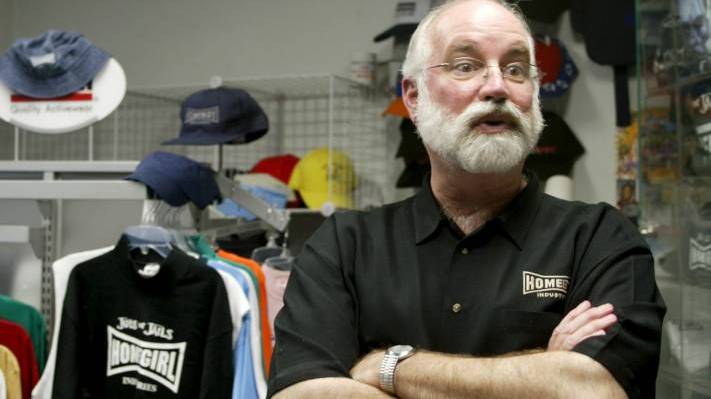"What I'm Reading" Wednesday: Barking to the Choir
Allyson Kenny
Wednesday, November 14, 2018

CNS photo/Armando Arorizo, EPA
Barking to the Choir: The Power of Radical Kinship by Fr. Greg Boyle, SJ
Fr. Greg Boyle, SJ, was assigned as parish priest to Dolores Mission in Los Angeles, California, in 1986. At that time Dolores Mission was the poorest parish in Los Angeles, surrounded by housing projects in a neighbourhood riddled with gang violence. Fr. Greg has laid to rest over 300 young people who have been caught in the crosshairs. Out of Boyle's parish ministry grew Homeboy Industries, an independent nonprofit organization dedicated to providing former gang members with positive opportunities and a supportive, loving community. Homeboy provides jobs in various areas, including their café, bakery, and silkscreen printing business. Their most popular outreach is a laser tattoo removal clinic, where the machines work literally 24/7. As an in-demand speaker for everyone from parish groups to social workers to state politicians, most of Fr. Greg’s anecdotes in Barking to the Choir (Simon & Schuster, 2018) are drawn directly from his talks. The book volleys back and forth between personal stories of Boyle’s relationship with a particular homeboy or homegirl (as former gang members who come to Homeboy Industries are called) to reflections on the deeper meaning those stories point us towards. Some are laugh-out-loud funny, like the outrageous tale of hospitalized homie, Bear, calming his anxious friends, Shorty and Magoo. Others are achingly sad, portraits of young men so beloved you can feel Fr. Greg’s affection for them bleeding through the pages. Some violence is so senseless that it borders on absurd. We learn, for example, that after turning his life around, one homie is gunned down by his ex-gang’s rivals while out watering the lawn of his newly-purchased home. This is not a book to read if you do not want to be touched or challenged to live out your faith in radical solidarity with those on the margins. For as Fr. Greg - or G-Dog, as he’s known to the homies - reminds us, when we step out to the peripheries, they automatically cease to exist as a “periphery” at all. This radical inclusion is what Jesus created everywhere he went, and it’s what He calls us to today. While gang violence may not be the particular type of marginalization that manifests itself in your own community, you won’t have to look far before you find many who are excluded, abandoned, and unloved in your own neighbourhood. Start there, and read Barking to the Choir as a meditation on the signposts by which we recognise our shared humanity in community and vulnerability. Note: I’d also recommend you do yourself a favour by picking up a copy of Boyle’s previous book, Tattoos on the Heart, before you read this one; you’ll be supporting the work of Homebody Industries in the process, as all the author’s proceeds are donated to the charity. While it isn’t absolutely necessary to read Tattoos before Barking, the former will immensely deepen your appreciation for the latter. You won’t regret it.Favourite quote (p. 172 of the hardcover edition):
“Once a reporter commented to Cesar [Chavez]: ‘Wow, these farm workers. They sure do love you.’ And Cesar smiled, shrugged, and said, ‘The feeling’s mutual’. “When the feeling’s mutual, we are seized by a tenderness that elevates us to the very largeness of God. As Christians, we want to bridge the gap that exists between people. Even in service, there is a distance: ‘Service provider . . . service recipient.’ Service is where we begin, yet it remains the hallway that leads to the ballroom. The ballroom is the place of exquisite mutuality. At Homeboy Industries, I’m not the ‘Great Healer’ and that homeboy over there is not in need of my precious healing. Truth be told, we are all in need of healing; we are all a cry for help. The affection of God unfolds when there is no daylight separating us.”Related Articles:
Tag: 黎穎楓修士
6月24日:耀漢小兄弟會黎穎楓修士和張世協修士將晉秩為執事
Wednesday, June 19, 2024
 鹽與光
鹽與光
【鹽與光傳媒資訊】2024年6月24日(聖若翰洗者誕辰),也是耀漢小兄弟會主保瞻禮。當天該修會將有兩位修士領受執事聖職,他們分別是黎穎楓修士(Brother Francis Lai)和張世協修士(Brother Thomas Truong)。歡迎大家前往參與慶典或收看網上直播。
耀漢小兄弟會方濟兄弟黎穎楓修士發終身願感恩聖祭
Wednesday, August 23, 2023
 鹽與光
鹽與光
黎穎楓修士(會名:方濟 Francis)是多倫多華人堂區中華殉道聖人堂的弟兄,他於2017年加入耀漢小兄弟會,是該修會首位北美本地聖召。方濟修士將在2023年8月24日 (星期四)於中華殉道聖人堂矢發永願,當天的感恩聖祭由耀漢小兄弟會現屆愛德省會長秦瑛神父主禮嘉。歡迎大家前往參與。
1
SUPPORT LABEL
$50
$100
$150
$250
OTHER AMOUNT
DONATE
Receive our newsletters
Stay Connected
Receive our newsletters

Stay Connected












